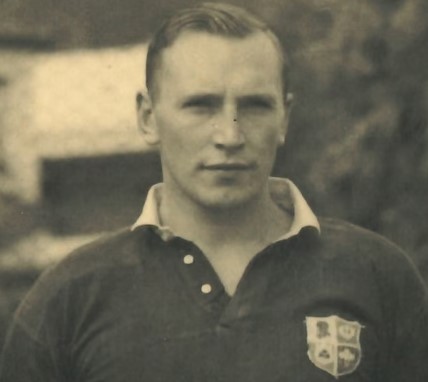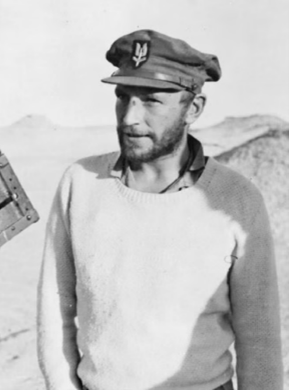A Lion of War
0The British & Irish Lions start their Australian Tour on Saturday night in Perth against the Western Force, albeit on the back of an inauspicious beginning with a loss to the Pumas last weekend.
2025 though marks 110 years since the birth, and 70 years since the death, of one of greatest men to ever pull on the famous red jersey; one most people would never have heard of.
——————-
Robert Blair Mayne was born in Newtownards, just outside of Belfast. A member of a staunch Ulster Protestant family, his childhood saw the first era of The Troubles in the 1920s and with it the partition of Ireland into the North and the Irish Free State. His talents as a sportsman showed through during his time at Regent House Grammar School, playing rugby for the First XV along with cricket, golf, and developed as a keen marksman. He was no dummy academically either, achieving entry into Law School at Queen’s University in Belfast where he trained to become a solicitor.
His sporting prowess further expanded when the now 6’3” Mayne took up Boxing, and in 1936 he was Irish Universities heavyweight champion and runner-up at the British University championships. His rugby career forged ahead as well, and while still at Queen’s he was selected for Ireland to play Wales, the first of nine caps for the Men In Green.
In 1938 he was selected for the Lions tour in South Africa where he played in seventeen of the 20 tour matches and all three Tests against the Springboks where he earned praise from both the home and touring journalists.
But that tour showed the other side of Mayne, by now almost ubiquitously known as “Paddy”. Tales of his antics are tucked away in Lions lore, including one incident where, bored by a formal reception, he snuck away to go hunting. With management seemingly none the wiser about his whereabouts he returned hours later, dumping the gutted carcass of an antelope on his roommate’s bed and his tuxedo filthy with mud, blood, and other detris.
Post-tour he completed his law degree at Queen’s and played a further three Tests for Ireland, before the outbreak of War changed things.
—————–
Mayne had already signed up as an office cadet prewar, and after some training received a commission in the Royal Artillery. Thirsting for action after the debacle of the Battle of France and the miracle of the Dunkirk evacuation, Mayne joined No.11 (Scottish Commando) and saw action in the Syrian-Lebanon campaign. Mayne’s temper and penchant for drinking were an issue, and in June 1941 he was dismissed from No.11 Commando for striking a superior officer who had shot a dog Mayne had befriended.
By then however, Mayne had come to the attention of a tall, shambling, Scottish officer with an eye for the unconventional, David Stirling. Mayne joined Stirling’s unit – then known as L Detachment, Special Air Brigade – and became the commander’s right-hand man. Together they, and the men of their unit which by now was known as the Special Air Service, or SAS, wrought havoc and chaos on the Axis forces in North Africa hitting supply dumps and airfields well behind the lines, perhaps most famously in the raid on Sidi Haneish in July 1942. Maybe was awarded the Distinguished Service Order (DSO) for one his leadership and gallantry on another raid at Wadi Tamet deep inside occupied Libya.
Following Stirling’s capture in Tunisia in early 1943, Mayne took over as commander of one part of the SAS, the Special Raiding Squadron. He earned a bar (second award) of the DSO for actions ahead of the Allied landings in Sicily where his unit captured several gun emplacements and killed or captured several hundred Italians.
Promoted to Lieutenant-Colonel in early 1944, Mayne was appointed as commander of the whole reformed 1st SAS Regiment and moved the unit back to England for the forthcoming invasion. He earned a third DSO shortly after D-Day, and in the final weeks of the war led the SAS on yet another daring raid deep into Germany. Field Marshal Bernard Montgomery approved the award of the Victoria Cross to Mayne, but it was downgraded to yet another DSO; one of just handful of men to receive the award full time. Even King George VI was known to have commented that the supreme award for gallantry had “so strangely eluded him”.
Post-war Mayne returned to practicing law in Newtownards, but even at just 30 his back and other war injuries prevented a return to rugby. But he seldom talked about his wartime experiences and drank heavily; had modern treatments been available he likely would have been diagnosed with Post-Traumatic Stress Disorder.
Mayne died just before Christmas 1955. Having attended a meeting in nearby Bangor he continued drinking afterwards. He was found dead in his car hours later, having collided with a farm vehicle.
Mayne’s wartime exploits have received new attention in the TV series SAS: Rogue Heroes, and efforts continue to be made to award him the Victoria Cross he may have been cruelly denied.
Robert Blair “Paddy” Mayne. Lion #307. One who truly roared.
Follow Scott on Twitter


